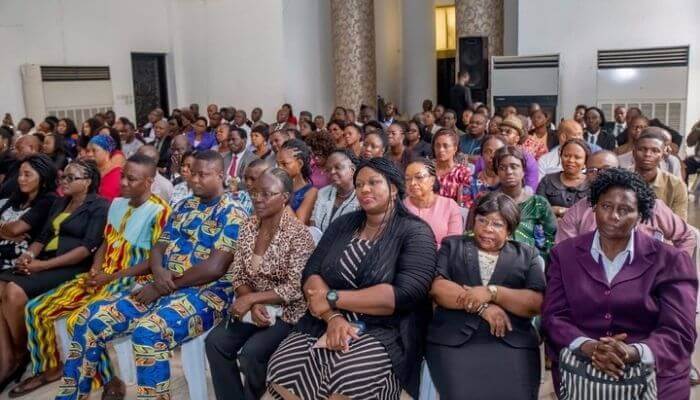BY VICTOR TERHEMBA AND CHARLES ASIEGBU
The magnitude and severity of economic issues (or Shege) faced by many Nigerians in 2023, particularly the youth, may have created a sense of apprehension for 2024. According to a 2023 World Bank study, fiscal measures such as the withdrawal of petrol subsidies put significant pressure on the cost of living, pushing more Nigerians into poverty.
For context, a record 104 million Nigerians presently live in poverty. As we bade farewell to 2023 and seeped into 2024, young Nigerians collectively adopted the “No Gree for Anybody” mantra that has metamorphosed into a new year resolution. “No Gree for Anybody” can be loosely defined in English as an admonition to “never succumb or be subdued by any adversary or adversity”.
The phrase “No Gree for Anybody” originated as a source of comic relief, featuring visuals and audio elements that conveyed a sense of decisiveness often characterised as “cruise”. However, it has evolved into a hidden statement protesting the increasingly challenging economic conditions experienced by Nigerians. Given this background, it is crucial to establish a framework for this resolution, clearly outlining the intended meaning of the catchphrase. The youths must direct their enthusiasm towards employing the appropriate combination of skills and attitudes to contribute to the improvement of Nigeria.
Advertisement
The first New Year’s resolutions occurred 4,000 years ago. The ancient Babylonians were the first to celebrate a new year with a resolution. Their New Year celebration was a 12-day festival called Akitu, which began at the start of the spring planting season in March, around 2000 B.C. During the celebrations, Babylonians would make resolutions to their gods. But they probably didn’t make any promises to exercise more, save more money, or start a new hobby. The Babylonians usually pledged their loyalty to the king while promising to pay their debts and return borrowed items to their rightful owners. They believed that if they kept their resolutions, the gods would treat them favourably that year. But, if they broke their promises, they would get on the bad books of the gods.
The modern-day Gregorian New Year began in ancient Rome in 46 B.C., when Emperor Julius Caesar introduced a new calendar and declared January 1 the start of the new year. The Romans began the new year in March (like the Babylonians) but moved it to January to honour the Roman god Janus. He was a two-faced god who could look back to the past year and forward to the new year. At the new year, the Romans would offer sacrifices to Janus and make resolutions for good behaviour.
More than 4,000 years later, New Year resolutions have become a global tradition indulged in by almost everyone. While some people argue that January 1st is just another day like every other day, others see it as an opportunity to start all over on a clean slate and set goals for the year.
Advertisement
The catchphrase has ignited a subtle yet intriguing controversy. While Nigerians engrossed themselves on social media with amusing memes and videos encapsulating the spirit of “No Gree for Anybody,” the pronouncement from the Nigeria Police spokesman, ACP Olumuyiwa Adejobi, during a press briefing added complexity to the issue. He deemed “No Gree for Anybody” as mere casual discourse, but it was viewed as a potentially perilous slogan capable of inciting crises within security.
The ACP said that intelligence reports indicated the slogan is a source from the retributory sector, suggesting the possibility of nationwide issues arising from this seemingly innocuous phrase. Predictably, Nigerians responded, echoing concerns and reactions.
In striking contrast, the Nigerian Defense Headquarters, also profoundly embedded in Nigeria’s security and intelligence architecture, chose to publicly align with and embrace the slogan. Their official stance for 2024 resonated with a call for citizens to perceive security as a collective responsibility, explicitly stating, “No gree for terrorists. No gree for perpetrators of insecurity“. The juxtaposition of these two security agencies taking divergent positions raises questions about potential discrepancies and the necessity for better collaboration.
While the colloquial expression “No Gree for Anybody” may serve for amusement and levity, we prefer a position akin to the Defense Headquarters. Our fervent plea is for Nigerians to vehemently reject instances of substandard governance, inept leadership, and the opaqueness displayed by public officials. This is not akin to the Nigeria police’s jesting expression of a “retribution call”. It transcends mere levity—it is a patriotic call to rally Nigerians against succumbing to the deleterious effects of poor governance and to uphold their civic responsibility of holding leaders accountable. Citizens unwittingly contribute to the quality of governance when they shirk their responsibility, forgetting the fundamental truth that the government exists for the people and its legitimacy is derived from the people. Hence, this is a passionate appeal not to give up and consciously reject ineffective governance.
Advertisement
Every citizen assumes a pivotal role in building the nation, whether as a governed citizen or an entrusted leader. When we, through the democratic process, elect individuals to positions of authority, we effectively entrust them with our sovereign power, with the bargain that they will advocate for and pursue our collective interests. The authority wielded by leaders is not inherent but a bestowed privilege from the people. As we relinquish our sovereign power to rule to those chosen in elections, civic engagement emerges as a vital avenue, allowing us to vigilantly scrutinise and appraise the judicious exercise of these powers by our elected representatives, with the explicit aim of advancing our communal well-being.
Democracy stands as the preeminent governmental system, giving citizens the formidable ability to participate and actively demand accountability from their leaders.
While the results of democratic elections may not resonate universally with every member of society, it is crucial not to use this as a pretext to neglect one’s civic responsibilities solely because of disapproval of the elected government. As Plato aptly stated, “the price of apathy towards public affairs is to be ruled by evil men.” Our civic responsibility encompasses the ability to evaluate and hold any administration accountable, regardless of our personal inclinations or electoral decisions. The essence is not in personal preferences but in delivering effective governance to the people.
Like the Babylonians and Romans, it becomes imperative for us to forge resolutions of utmost commitment. Such steadfast dedication is poised to usher us into a realm blessed with exemplary leadership and refined governance systems. We should uphold our civic obligation to keep leaders responsible and aggressively advocate for policies that benefit the public. Political officeholders are obligated by their posts to serve the public and to govern in a manner consistent with Nigerians’ wishes and well-being.
Advertisement
To accomplish this, we must track government spending and promises. Youths must support genuine civil society organisations that have invested human and material resources in achieving their fundamental goals as government accountability partners. We must take ownership and supervise the competent execution of programs and projects. To successfully advise the government, youngsters must develop an interest in and engage in essential local and global governance data.
Victor Terhemba is a civil society advocate and Executive Director at the Raising New Voices Initiative.
Advertisement
Charles Asiegbu is a policy researcher and development practitioner. He is a Bridge Fellow of the Nigerian Economic Summit Group (NESG).
Advertisement
Views expressed by contributors are strictly personal and not of TheCable.
Add a comment






